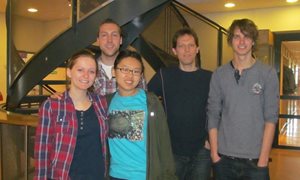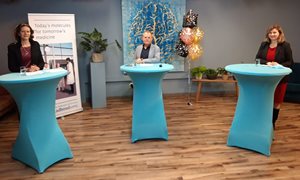
Elena Macías-Sánchez, theme Reconstructive and Regenerative medicine, has been awarded a prestigious Marie Sklodowska-Curie Individual Fellowship, to develop a two-year project investigating the process of bone mineralization. Elena will develop a new imaging platform combining Liquid Phase Electron Microscopy (LPEM) with immunolabelling to study the role of regulatory molecules (proteoglycans) in mineral formation at nanoscale resolution. “By recreating the physiological mineralization conditions inside a liquid cell, we aim to obtain real-time data on the mineralization dynamics of bone.”
Despite its clinical relevance, the mechanism of bone formation is still poorly understood, mainly due to the complexity of the underlying processes. Until now most studies relied on simplified in vitro models that cannot represent this complexity. Furthermore, methods traditionally applied only provide snapshots of these processes, unable to extract dynamic information. “To really understand the mechanisms regulating bone mineralization, we need to simultaneously visualize the different components in their context, to be able to monitor these complex interactions.”
The project will be carried out at the Department of Biochemistry, under the supervision of Nico Sommerdijk, theme Nanomedicine/Reconstructive and Regenerative medicine, and in close collaboration with Niels de Jonge from the Leibnitz Institute for New Materials (INM, Saarbrucken). Sommerdijk and De Jonge pioneer the study of biomolecular interactions in the hydrated state by means of electron microscopy. The project is supported by the Electron Microscopy Center recently established within the RTC Microscopy.
Related news items

RIMLS awards call for nominations
19 October 2021 RIMLS awards several prizes to stimulate and honor our (young) researchers. Upcoming awards are Supervisor of the Year, Best Master Thesis, Best Publication, Best Image and more. Send your nominations now before 24 November 2021. go to page
Turbo Grants for four medical-technical research projects
19 October 2021 Four TURBO grants were recently awarded to new technical-medical research proposals. The grants are part of the TURBO program, a collaboration between the University of Twente (TechMed Centre) and the Radboudumc. go to page
Miniaturized microfluidic platform for automated epigenetic profiling
6 May 2021 Together with Fluidigm, a US-based company focusing on microfluidics, the team of Hendrik Marks publishes in Genome Research the development of a powerful plug and play ChIP-seq platform for minute amount of cells, such as embryonic specimens or small biopsies. go to page
RIMLS online award ceremony proudly presenting the winners
13 January 2021In this special webinar of the RIMLS New Year Celebration, scientific director René Bindels reviewed 2020 and looked forward to 2021. But more importantly a number of researchers received prizes in the traditional RIMLS awards ceremony.
go to page
NWO CHAINS 2020 poster prize winner: Judith Schaart
5 January 2021 Judith Schaart wins the NWO CHAINS 2020 poster prize for 2nd Best Chemistry of Life. go to page